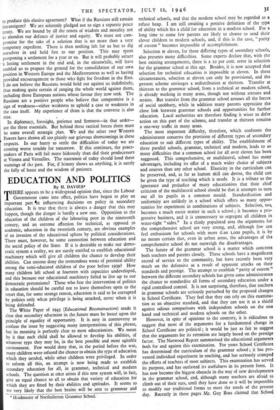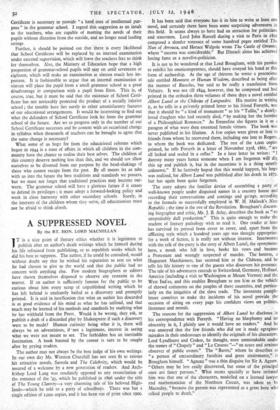EDUCATION AND. POLITICS
By H. DAVIES*
THERE appears to be a widespread opinion that, since the Labour Government came into office, politics have begun to play an important part.tin influencing decisions on policy in secondary education. It is true that there is always a danger that this may happen, though the danger is hardly a new one. Opposition to the education of the children of the labouring poor in the nineteenth century, and an extreme affection for technical, as opposed to academic, education in the twentieth century, are obvious examples of an invasion of the educational sphere by political considerations. There must, however, be some connection between education and the social policy of the State. If it is desirable .to make our demo- cratic system a reality, we are surely entitled to establish educational machinery which will give all children the chance to develop their abilities. Can anyone deny the tremendous waste of potential ability among the semi-educated children of the poor before 1939? How many children left school at fourteen with capacities undeveloped, and this because our educational machinery failed to live up to our democratic pretensions? Those who fear the intervention of politics in education should be careful not to leave themselves open to the retort that, for some strange reason, education is said to be corrupted by politics only when privilege is being attacked, never when it is being defended.
The White Paper of 1943 (Educational Reconstruction) made it clear that secondary education in the,future must be based upon the principle of equality of opportunity. It is. easy in controversy to confuse the issue by suggesting many interpretations of this phrase, but its meaning is perfectly clear to most educationists. We mean by it that each child shall be allowed to develop his abilities, of whatever type they may be, in the best possible and most suitable environment Few would deny that, in the period before the war, many children were refused the chance to obtain the type of education which they needed, while other children were privileged. In order to reform all this, an attempt is now being made to establish secondary education for all, in grammar, technical and modern schools. The question at mice arises if this new system will; in fact, give an equal chance to all to obtain that variety of education for which they are fitted by their abilities and aptitudes. It seems to me -very likely that the best brains will be _sent to grammar and
* Headmaster of Northallerton Grammar School.
technical schools, and that the modem school may be regarded as a refuse heap. I am still awaiting a positive definition of the type of ability which fits a child for education in a modern school. For a long time to come few parents are likely to choose to send their clever children to modern schools, and, if this is the case, " parity of esteem " becomes impossible of accomplishment.
Selection at eleven, for these differing types of secondary schools, also presents many difficulties. Some experts declare that, with the best existing arrangements, there is a to per cent. error in selection for the grammar school at this age. Besides, it is now accepted that selection for technical education is impossible at eleven. In these circumstances, selection at eleven_ can only be provisional, and the present scheme envisages a redistribution at thirteen. Transfer at thirteen to the grammar school, from a technical or modern.school, is already working in many areas, though not without stresses and strains. But transfer, from the grammar school arouses all the forces of social snobbery, while in addition many parents appreciate the close link between grammar schools and opportunities for further education. Local authorities are therefore finding it wiser to defer action on this part of the scheme, and transfer at thirteen remains a one-way traffic in many areas.
The most important difficulty, therefore, which confronts the administrator concerns the provision of different types of secondary education to suit different types of ability. The establishment of three parallel schools, grammar, technical and modern, leads to so many difficulties that a common school for all over eleven has been suggested. This comprehensive, or multilateral, school has many advantages, including its offer of a much wider choice of subjects and courses than any other school. Elasticity in the curriculum can be preserved, and, as far as human skill can devise, the child can be given the type of teaching which it needs. It is a tribute to the ignorance and prejudice of many educationists that their chid criticism of the multilateral school should be that it attempts to turn out all its pupils in a common mould. Standardisation and uniformity are unlikely in a school which offers so many oppor- tunities for experiment in combinations of subjects. Selection, too, becomes a much easier matter in such a school ; it becomes a pro- gressive business, and it is unnecessary to segregate all children in water-tight " sides." In a thinly populated area the arguments for the comprehensive school are very strong, and, although few can feel enthusiasm for schools with more than t,000 pupils, it is by no means certain that, even in urban areas, the advantages of the comprehensive school do not outweigh the disadvantages.
The future of the grammar school is a matter which concerns both teachers and parents closely. These schools have a magnificent record of service to the community, but have recently been very much on the defensive as a result of apparent , attacks on their standards and prestige. The attempt to establish " parity of esteem " between the different secondary schools has given some administrators the chance to standardise all forms of secondary education under a rigid centralised control. It is not surprising, therefore, that teachers in grammar schools are seriously perturbed by the proposed changes in School Certificate. They feel that they can rely on this examina- tion as an objective standard, and that they can use it as a shield against odious comparisons with independent schools on the one hand and technical and modern schools on the other.
However, in spite of opinions to the contrary, it is ridiculous to suggest that most of the arguments for a fundamental change in School Certificate are political ; it would be just as fair to suggest that the arguments for its retention are largely based on the prestige factor. The Norwood Report summarised the educational arguments both for and against this examination. For years School Certificate has determined the curriculum of the grammar school ; it has pre- vented,individual experiment in teaching, and has seriously cramped the efforts of teachers of most subjects. This examination has served its purpose, and has outlasted its usefulness in its present form. It has now become the biggest obstacle in the way of new developments in the grammar school, and, although many teachers are afraid to climb out of their ruts, until they have done so it will be impossible to modify our traditional forms to meet the needs of the present day. Recently in these pages Mr. Guy Boas claimed that School. Certificate is necessary to provide " a hard core of intellectual pur- pose " in the grammar school. I regard this suggestion as an insult to the teachers, who are capable of meeting the needs of their pupils without dictation from the outside, and no.longer need leading strings.
Further, it should be pointed out that there is every likelihood that School Certificate will be replaced by an internal examination under external supervision, which will leave the teachers free to think for themselves. Also, the Ministry of Education hope that a high proportion of grammar-school pupils will stay on until seventeen or eighteen, which will make an examination at sixteen much less im- portant. It is fashionable to argue that an internal examination at sixteen will place the pupil from a small grammar school at a great disadvantage in comparison with a pupil from Eton. This is of course, true, but it must be said that the existence of School Certi- ficate has not noticeably protected the product of a socially inferior school ; the trouble here lies surely in other unsatisfactory features of our educational arrangements. It would be interesting to fmd out what the defenders of School Certificate look for from the grammar school of the future. Are we to progress only in the number of our School Certificate successes and be content with an occasional change in syllabus when thousands of teachers can be brought to agree that the same change is necessary?
What some of us hope for from the educational reforms which began in 1944 is a state of affairs in which all children in the com- munity have the chance to realise their best selves. The children of this country deserve nothing less than this, and we should not allow ourselves to be diverted from our purpose by the head-shakings of those who cannot escape from the past. By all means let us take with us into the future the best traditions and standards we possess, but we must not forget that traditional practices may become out- worn. The grammar school will have a glorious future if it ceases to defend its privileges ; it must adopt a forward-looking policy and work in close harmony with other secondary schools. Surely, in the interests of the children whom they serve, all educationists must not be afraid to think afresh.































 Previous page
Previous page